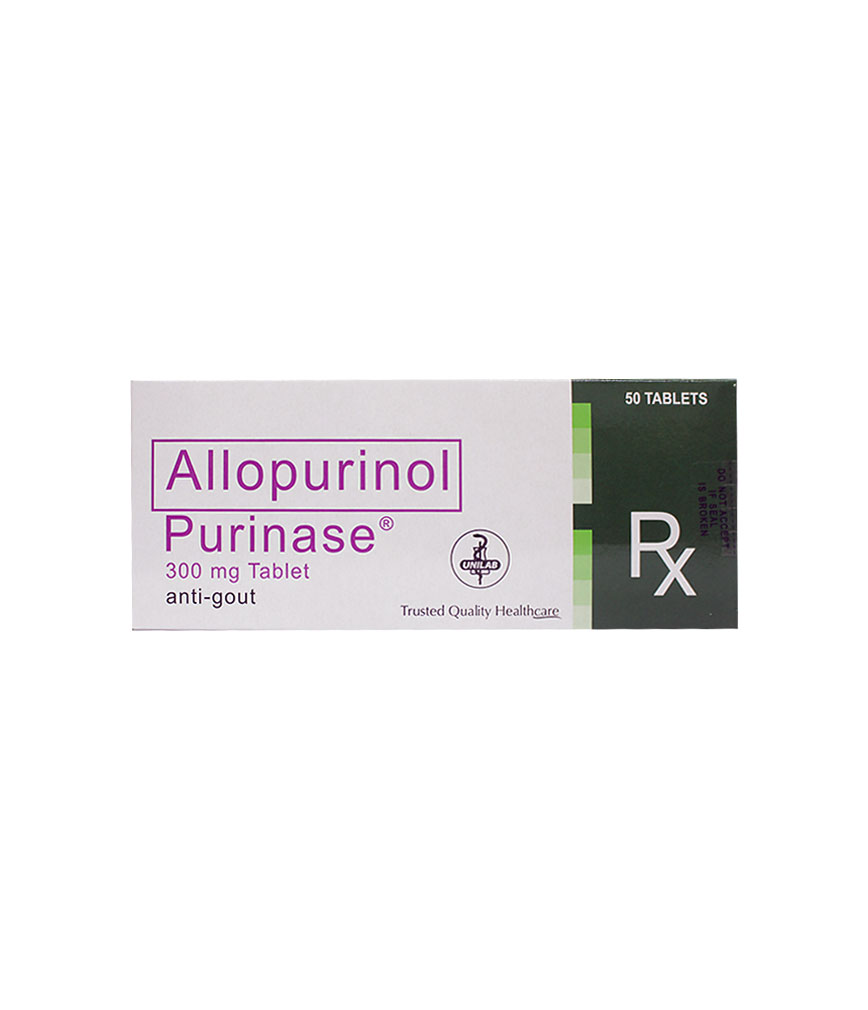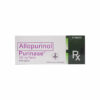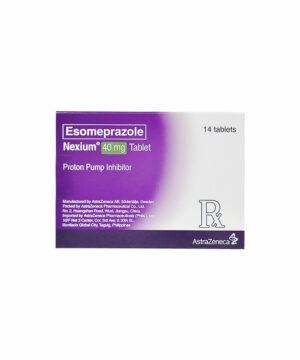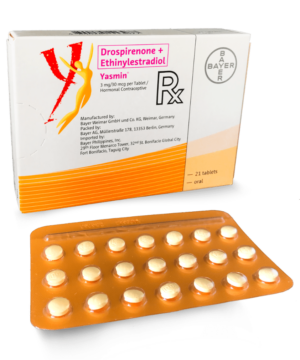Description
PURINASE 300MG TABLET
Indications / Uses :
Management of patients with signs and symptoms of primary and secondary gout (recurrent acute attacks, arthropathy, tophi, radiographic changes of gout or associated uric acid nephrolithiasis).
Management of patients with leukemia, lymphoma and solid tumor malignancies who are undergoing chemotherapy expected to result in tumor lysis and subsequent elevations of serum and urinary uric acid concentrations. Allopurinol therapy should be discontinued when the potential for hyperuricemia is no longer present.
For the management of patients with recurrent calcium oxalate renal calculi in males whose urinary urate excretion >800 mg daily and in females whose urinary urate excretion exceeds 750 mg daily. The use of allopurinol for this condition must be carefully evaluated initially and reevaluated periodically to determine that therapy with the drug is beneficial and outweighs the risks.
Administration :
Should be taken with food.
Contraindications :
Hypersensitivity to allopurinol or any of the component of Purinase.
Special Precautions :
Severe Hypersensitivity Reactions: Serious hypersensitivity reactions, including skin reactions associated with exfoliation, fever, lymphadenopathy, arthralgia and/or eosinophilia including SJS and TEN occur rarely. Associated vasculitis and tissue response may be manifested in various ways including hepatitis, renal impairment and very rarely, seizures. If such reactions occur, allopurinol should be withdrawn immediately and permanently.
Corticosteroids may be beneficial in overcoming hypersensitivity skin reactions. When generalized hypersensitivity reactions have occurred, renal and/or hepatic disorder has usually been present particularly when the outcome has been fatal.
Angioimmunoblastic lymphadenopathy has been described very rarely following biopsy of a generalized lymphadenopathy. It appears to be reversible on withdrawal of allopurinol.
Skin and Subcutaneous Reactions: Skin reactions are the most common reactions and may occur at any time during treatment. They may be pruritic, maculopapular, sometimes scaly, sometimes purpuric and rarely exfoliative. Allopurinol should be withdrawn immediately should such reactions occur.
Angioedema has been reported to occur with and without signs and symptoms of a more generalized hypersensitivity reaction.
Asymptomatic Hyperuricemia: Allopurinol is not indicated for the treatment of asymptomatic hyperuricemia. Adequate fluid intake (2 L/day) and dietary modification of the underlying cause may correct the condition.
In the general population, asymptomatic hyperuricemia should not be routinely treated with allopurinol. Well-known associated risk factors of hyperuricemia eg, dyslipidemia, obesity, metabolic syndrome, psoriasis, malignancies and congestive heart failure should be addressed.
Lifestyle changes are recommended which include appropriate diet and exercise.
Acute Gouty Attacks: Allopurinol may increase the frequency of acute gouty attacks during the first 6-12 months of therapy, even when normal or subnormal serum uric acid levels have been attained. The attacks usually become shorter and less severe after several months of treatment. The mobilization of urates from tissue deposits which cause fluctuations in the serum uric acid levels is thought to be the mechanism of these episodes. Patients should not be started on allopurinol treatment until an acute attack of gout has completely subsided, as further attacks may be precipitated.
In the absence of contraindications (ie, gastrointestinal ulcers or renal impairment), colchicine, traditional nonsteroidal anti-inflammatory drugs (NSAIDs) or selective cyclooxygenase (COX)-2 inhibitors may be used for the treatment of acute gouty arthritis.
Ice compress may be given in combination with pharmacologic agents for relief of joint pain and swelling of acute gouty arthritis.
Cardiac Insufficiency or Hypertension: Allopurinol should be used with caution in patients under treatment for hypertension or cardiac insufficiency eg, with diuretics or angiotensin-converting enzyme (ACE) inhibitors, since such patients may have some concomitant impairment of kidney function.
Xanthine Deposition: In conditions where the rate of urate formation is greatly increased (eg, malignant disease and its treatment, Lesch-Nyhan syndrome), the absolute concentration of xanthine in urine could, in rare cases, rise sufficiently to allow deposition of xanthine stones in the urinary tract. This risk may be minimized by adequate hydration to achieve optimal urine dilution.
Impaction of Uric Acid Renal Stones: Adequate therapy with allopurinol will lead to dissolution of large uric acid renal pelvic stones, with the remote possibility of impaction in the ureter.
Drowsiness: There have been reports of drowsiness during allopurinol therapy. Patients should be warned that this may impair their ability to perform activities requiring mental alertness.
Bone Marrow Depression: There have been reports of bone marrow depression particularly in patients receiving concomitant drugs which have potential to cause the reaction. This may occur as early as 6 weeks to as long as 6 years after initiation of allopurinol therapy. In patients receiving allopurinol alone, varying degrees of bone marrow depression, after affecting =1 cell lines may be observed rarely.
Concomitant Illness: Renal Insufficiency: Since allopurinol and its metabolites are excreted by the kidneys, impaired renal function may lead to retention of the drug and/or its metabolites with consequent prolongation of their plasma t?.
Some patients with preexisting renal disease or poor urate clearance have shown a rise in blood urea nitrogen (BUN) during allopurinol administration. Patients with impaired renal function must be carefully observed while taking allopurinol (particularly during the early stages of therapy) and the dosage decreased or the drug discontinued if evidence of deterioration in renal function occurs and persists.
Renal failure associated with allopurinol use has been reported in patients with hyperuricemia secondary to neoplastic diseases. Concomitant illnesses eg, multiple myeloma and congestive myocardial disease were seen in patients whose renal dysfunction increased after allopurinol was started. Renal failure is also frequently associated with gouty nephropathy and rarely with hypersensitivity reactions associated with allopurinol. Albuminuria has been reported in patients who developed clinical gout following chronic glomerulonephritis and chronic pyelonephritis.
Particular care should also be taken in the elderly where renal function may be reduced thus leading to retention of the drug and its metabolites with consequent prolongation of action.
Hepatic Insufficiency: There have been a few cases of reversible clinical hepatotoxicity and asymptomatic increase in serum alkaline phosphatase or serum transaminase observed in patients receiving allopurinol. If patients receiving allopurinol develop anorexia, weight loss or pruritus, assessment of liver function should be included in the diagnostic evaluation. Periodic liver function tests and complete blood counts are recommended during the early stages of therapy in patients with preexisting liver disease.
Information for Patients: Allopurinol should be discontinued immediately at the first sign of a skin rash, painful urination, blood in the urine, irritation of the eyes or swelling of the lips or mouth. Patients should also be advised to consult their physician immediately if such reactions occur.
Fluid intake (2 L/day) during therapy is recommended to prevent renal stones.
If a single dose of allopurinol is occasionally missed, there is no need to double the dose at the next scheduled time. Patients should be reminded that there may be certain risks associated with the concomitant use of allopurinol and dicumarol, sulfinpyrazone, mercaptopurine, azathioprine, ampicillin, amoxicillin and thiazide diuretics.
In order to minimize gastric irritation, patients should take allopurinol after a meal. Patients should not take allopurinol without the advice of a physician. Regular follow-up with a physician is recommended.
Effects on the Ability to Drive or Operate Machinery: Allopurinol can cause drowsiness and can affect coordination.
Patients should exercise caution before driving, using machinery or participating in dangerous activities until they are sure that allopurinol does not adversely affect performance.














Reviews
There are no reviews yet.